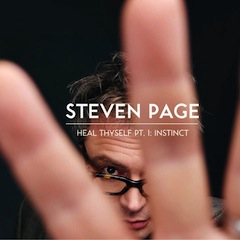Steven Page describes his latest recording as “all about finding humility. I’m exploring my own foibles.” (photo from Steven Page)
Has it already been 25 years since we first heard radio hits “If I Had a Million Dollars” and “Be My Yoko Ono”?
In early 1992, Toronto-based Barenaked Ladies’ first label recording, Gordon, was released. It also produced classics “Enid,” “Grade 9” and “Brian Wilson.”
It didn’t take much time for stardom to follow, particularly after the next series of hits, “One Week” and “Pinch Me,” and a string of infectious melodies emanating from a dozen albums to come over the next 17 years.
It’s been said that frontman (and lantzman) Steven Page, who began the group with childhood chum Ed Robertson, wrote or contributed to 97 out of the 113 original Barenaked Ladies tunes. Since 2008, however, Page has pursued a divergent path.
Beginning with a split from the band – hastened by his much-publicized 2008 cocaine bust – Page has carved out a solo musical career, while also, in the past few years, candidly speaking to a variety of audiences about his battle with mental health issues.
In 2010, his inaugural solo album of original material, Page One, was released. And, earlier this year, its followup, Heal Thyself Pt. 1: Instinct.
Jewish Independent: How does it feel to have wrapped up Heal Thyself?
Steven Page: It feels like a total relief. In the weeks coming up to its release I was in full panic mode, because it’s hard to let go of something that you’ve been working on, especially this one. I’ve been working on it for a long time.
You spend all your time kind of obsessing over it and massaging it and fixing it and redoing parts. I learned a long time ago not to over-produce something so it just gets slick. But, for me, it was actually just a matter of trying to get what I heard in my head coming out of the speakers. And that takes some tweaking, but it can lead to some pretty obsessive behavior as well. I had thought, is this going to get ignored? Is everybody going to hate it, or not going to understand it the way it was meant? Did I do my job properly? And then it’s out there. And you can’t control it anymore.
JI: But you’ve never made anything that anybody’s hated? Have you?
SP: No, I don’t think so. But I think most artists have those conversations in their heads. They write their own worst reviews before it’s actually released. But the wonderful thing is, people have been so positive about this record, in a kind of shockingly, exorbitant way.
It’s out of my studio and actually in front of people. Sharing it, it’s really a nice feeling.
JI: What are you trying to say with the album?
SP: One of the things that I’ve struggled with a lot over the last 20 years has been: what is the value of what I do for a living? Am I creating a product people may or may not buy? Am I expressing myself and, if I am, who cares? Why would anyone want to listen to me? So, all those kinds of struggles I think a lot of artist ask themselves, especially when art is becoming more devalued. It’s like, where do we fit?
At the end of the day, the record becomes all about finding humility. I’m exploring my own foibles.
I think anybody else of my age comes to a point where your kids get older, your parents get older and, obviously, you do, too. And you can’t fix everything, and you can’t be responsible for everything, but you can at least find some peace in what your contribution is.
 JI: Thus Heal Thyself?
JI: Thus Heal Thyself?
SP: Exactly. With that title also, it’s both sincere and ironic at the same time. It obviously comes from “physician, heal thyself,” which is a biblical quote from Jesus; it means don’t judge anybody else until you fix your own self. But, when you take it out of context, it sounds ridiculously snarky. In Jesus Christ Superstar, “heal yourselves, heal yourselves,” he says to the lepers. I thought that was kind of a funny dual meaning, but also is that sincere personal side.
JI: You have been known, over the course of your career, as this kind of funny guy, beginning with the Barenaked Ladies. What is underlying that funny or witty within the songs?
SP: Humor is still a big part of how I approach the world, whether that’s with a sense of sardonic, even some snark; sometimes, it’s also self-effacing. But I think I’ve finally moved past the full-on self-deprecation of some of my older material. And now it’s about finding the humor of the situation when you’re in the worst times. That’s how I look at the world, even when I’m in a pretty dark place. And I think I work really hard on my lyrics. I try not to have any throwaway lines or throwaway words or phrases. Everything is there for a reason. Sometimes a line just makes you laugh your head off when it’s in there.
JI: You spoke about dark places and I want to veer into it. You’ve spoken a lot about your bout with mental illness to audiences over the years. How has your perspective changed in your struggles?
SP: I think the biggest change for me is just that I’ve learned to lose the romance. I think it’s pretty easy when you’re in the arts to romanticize, especially depression and anxiety, neurosis. I mean, a lot of my favorite filmmakers and musicians and artists have multiple lives, and most of those are marked by anguish and mental health struggles.
I’ve realized over the years that, when I’ve struggled the most, I’ve been the least productive and the least creative. The hard times have given me perspective. Sometimes, it has given me an angle to write about, because I’m able to step back when I’m in a better place and assess it, and write about it and think about it.
I’ve learned to take it more seriously and learned to try to take care of myself, where before, I think, I would just let it go, because it seemed almost acceptable to me. We always see these images of the symphony conductor throwing a tantrum on the back of the stage, and that would be completely unacceptable if your band did it. It’s not that different. How you treat other people, the fallout from your behavior, how your illness influences you, is serious.
JI: Sometimes, people are frightened to seek help. They’re not sure if the help they get is going to help.
SP: I think what people are afraid of is medication, and I don’t blame them. Nobody wants to be on anti-depressants for the rest of their lives and, if it’s the wrong medication, then it can totally mess you up. I mean, it’ll make you sleepy, it’ll make you sad, you can never have another orgasm again, like all these horrible things.
There are all kinds of side effects to this stuff and the biggest problem, frankly, is that most people get their prescriptions from their family doctors and they get one prescription, because the family doctor says, “this one seems to work the most” or “haven’t heard any complaints.” You have to be able to go back and keep working until you find the right dosage, the right medication, the right cocktail of medications. The person who can prescribe should be a specialist and a psychiatrist.
So, what you end up doing is you get this one prescription and it makes you feel bad, or it makes you temporarily feel better after a couple of months, and you go, “OK, I’m better now,” and you stop taking it. I hear this all the time from people and I did it myself for years. You don’t follow up, you don’t follow through.
Depending on what their mental health struggles are, there are therapeutic talk therapies that don’t involve any medications at all. I work with a therapist who practises CBT, cognitive behavioral therapy, and it basically challenges your ingrained assumptions about yourself and gives you skills to learn how to defeat what I call the “sick brain,” by reminding yourself that sometimes your brain lies to you when you’re sick.
It’s not so much about mental health but mental fitness. It’s about having a relationship with somebody you trust.
People go to one therapist and feel judged, or feel they don’t have a connection, or they feel like they are in a relationship like they are with a parent or a teacher, [it] makes them feel uncomfortable and they don’t go back. People have to know that they should be able to audition people until you find the right match. One of the problems for most people is they can’t afford that.
JI: The health-care system needs to heal itself, too?
SP: Exactly. It needs to take mental health far more seriously.
I think people just need to keep reminding politicians that it’s a priority. Mental health, if it was treated with the same weight as physical health issues by the public – we have a prime minister now who’s dealt with this firsthand, with really horrific mental health issues with his mother, and she’s been such a great and open advocate – hopefully that would start to help. I really hope that he starts to help push the public perception in the right way.
JI: Songwriting, performing. What for you requires the most emotional strength or drive to do?
SP: There are several things. When it comes to writing, I’m both a workaholic and a procrastinator at the same time, if that makes any sense.
I’ll find a lot of ways to not commit to finishing a song. That’s why I love collaboration with another writer, because you push each other to go, whereas when you are by yourself, you have so much more space and so many more places to explore.
So, what I’ll do is, I’ll start to write something and then I’ll just start another song at the same time. I’ll work for 16 hours, but I didn’t finish a song.
The finality of a song is a bit scary to me, so that can be a challenge. But there are very few things that are as rewarding as finishing a song that you are proud of. And someone comes along and tells me they love a certain line, and it connects with them.
What is also hard is that there are times I’ve gone on stage and been a bit nervous.
JI: Nervous? Why?
SP: I’m not 100% sure. I might need more therapy for that.
I don’t do bad shows. But I want my show to be the best of mine they’ve seen, so there’s that added pressure on me.
Sometimes, I just have to trust myself and go into it, and try to get to that place where it’s transcendental for both me and the audience.
Dave Gordon is a Toronto-based freelance writer whose work has appeared in more than a hundred publications around the world.



 JI: Thus Heal Thyself?
JI: Thus Heal Thyself?